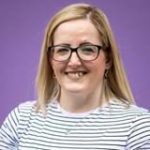I feel disconnected from the community
My name is Natalie. I am 38 years old and the mother of two girls. I also have Usher syndrome, a condition that means I am deaf and visually impaired.
We’re all likely to experience loneliness at some point in our lives. But having a disability means that you are more likely to be lonely.
The causes of loneliness among disabled people are complex. But they all stem from one thing – a sense of disconnection. This disconnection comes from barriers that prevent disabled people from feeling included. Many of the barriers for disabled people are practical, such as the need for accessible transport and buildings, financial support and appropriate social care.
For me personally, transport is a big issue. Being blind means that I can’t drive, and with just one bus running every hour through our village, my options for getting around are limited.
Another significant barrier for disabled people is a lack of understanding and awareness.
I have tunnel vision which means that I can only see the things I am looking directly at. If I am looking ahead, I can’t see the floor. Therefore, I use a cane. I’m conscious, though, that most people don’t realise that you can use a cane and still have partial sight. When I have my cane and then get out my phone… it makes people look. It’s embarrassing and makes me not want to use my cane.
The pandemic has made things even tougher
The local community groups have all closed due to the pandemic and the places I used to feel relatively comfortable going are no longer there.
The safety measures that have been introduced have also made life more challenging. It would be great if people were more understanding of this.
During lockdown, I have enjoyed going out for walks with my baby in her pushchair, but I find it difficult to maintain the two-metre distance with other people in the street because of my vision. It makes me so scared of hitting someone or bumping into anyone and I am worried that in doing so I will hurt myself, my baby or other people.
Face coverings are also a challenge. I can’t see if someone’s lips are moving, so it’s difficult to see if someone is talking to me. I would hate to think someone thinks I’m ignoring them and being rude.
A little understanding and awareness goes a long way
Disabled people don’t want to feel like a burden. They just want to be asked what their needs are, and then simple changes can make a big difference.
A great example of this is when I am booking a table at a restaurant online – they will occasionally ask what my accessibility needs are. It’s really useful to have done in advance.
Understanding staff and a bit of awareness goes a long way to help all disabled people feel welcome.
Full accessibility is a difficult thing to achieve as everyone is unique and has different needs. The key is being open to discussion and not assuming what people’s needs might be. This will help people like me get back out into the community post-lockdown.
Having a Sense volunteer buddy has been so important for me, especially now, since some of my other services have had to stop. Thank you Maria, and all the other Sense Buddies out there for all your hard work and dedication!
No one should be left out of life
Join us. Will you take action to make sure that no one is left out of life?
Think, Ask, Include
Read our top tips on how to make your local community disability-friendly.

